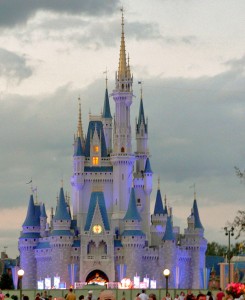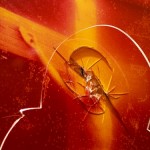Today’s post is by Dr. Heather Curtis, Associate Professor of Religion, Tufts University, Medford, Massachusetts.
 For most Americans, and especially for families with school-aged children, summer involves “vacation.” As a historian, I’m always struck by what a recent invention the practice of taking an extended hiatus from work, school, and ordinary occupations is. Like much of contemporary American life, vacations are the product of modernity – made possible (and perhaps necessary) by the industrial innovation, the rise of market capitalism, the creation of new forms of leisure for consumption. Vacations are also the province of the privileged – easily affordable for some, out of reach for many (especially in developing regions of the world). This summer, both these aspects of vacation were thrown into sharp relief for me at our family’s destination of choice: Walt Disney World in Orlando, Florida – the quintessential American holiday spot.
For most Americans, and especially for families with school-aged children, summer involves “vacation.” As a historian, I’m always struck by what a recent invention the practice of taking an extended hiatus from work, school, and ordinary occupations is. Like much of contemporary American life, vacations are the product of modernity – made possible (and perhaps necessary) by the industrial innovation, the rise of market capitalism, the creation of new forms of leisure for consumption. Vacations are also the province of the privileged – easily affordable for some, out of reach for many (especially in developing regions of the world). This summer, both these aspects of vacation were thrown into sharp relief for me at our family’s destination of choice: Walt Disney World in Orlando, Florida – the quintessential American holiday spot.
Let me start by saying that we had a great time. Since the original Disney Land first opened in Anaheim, California, in 1955, Disney has perfected the science of the modern vacation – developing amusements suitable for every appetite, striving to leave no whim or want unfulfilled, appealing to (and shaping) the dreams, fantasies, and desires of all “who come to this happy place.” From the moment visitors enter the “Vacation Kingdom,” Disney does everything right. The recently added Fastpass system, for example, makes it possible to avoid long lines for rides and attractions; and even when you do have to wait, Disney’s engineers have found ways to make standing around with young, fidgety boys feel fun.
After several days of speeding along the rails of Big Thunder Mountain and catapulting down the flume of Splash Mountain in the Magic Kingdom, marveling at the amazing accomplishments of technological innovation and reveling in the diversity of international cultures and cuisines at Epcot, gawking at the wonders of world-class animation and experiencing the thrill of free-fall on the Tower of Terror at the Hollywood Studios (I could go on . . . ), vacation began to feel, well, a little bit vacant. Amidst all the celebrations of human achievement, of the power of imagination, and of the pursuit of happiness, I found myself yearning for something deeper – for some acknowledgement of the divine in whom we live, and move, and have our being. Despite Disney’s best efforts to make all our wishes come true, there remain some desires that the world’s most popular entertainment resort just doesn’t satisfy.
Finding God at Disney wasn’t easy. The more I looked, the more the search seemed a quixotic quest. To seek the Holy in this decidedly human-centered paradise was also to come face-to-face with the emptiness at the heart of our pleasure-seeking passions. At the epicenter of the Magic Kingdom stands Cinderella’s Castle – the “fairy-tale fortress” that serves as the “central icon” representing “all of the Walt Disney Company.” When visitors ascend the steps of this fantastic structure, they discover that it is hollow.
Eventually, I did stumble across a reference to the spiritual world at Disney. In the Animal Kingdom, just at the entrance to “Asia,” there stands an altar to an unnamed deity. When I saw this shrine, I was reminded of the apostle Paul’s comments to the Athenians at Mars Hill when he found an altar dedicated to “an unknown God”: “The God who made the world and everything in it is the Lord of heaven and earth and does not live in temples built by human hands. And he is not served by human hands, as if he needed anything. Rather, he himself gives everyone life and breath and everything else. . . God did this so that they would seek him and perhaps reach out for him and find him, though he is not far from any one of us” (Acts 17:24-25, 27).
“God is not far from any one of us.” Recalling Paul’s message prompted me to reconsider how I was conducting my quest. It would be hard to find God in temples (or kingdoms) constructed by human hands (or imaginations). So, when I looked away from the altar in Asia, I turned my attention instead to the passersby – my fellow vacationers, divine creations all, each with the potential to reflect the glory and goodness of Grace. To find God in the faces and interactions of the people around me at Disney was to catch a glimpse of a different kingdom – not the exclusive utopia of modern American achievement that admits only those affluent enough to purchase a ticket (or, in my case, to have grandparents generous enough to pay the price!), nor the frenzied Fantasy Land of modern consumerism that creates and satiates cravings at a cost, but the Kingdom of Heaven that invites all human beings to experience Sabbath rest, to have their deepest longings met through the One whose grace is sufficient and free.












